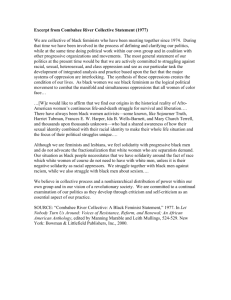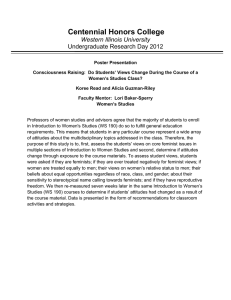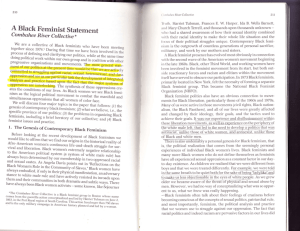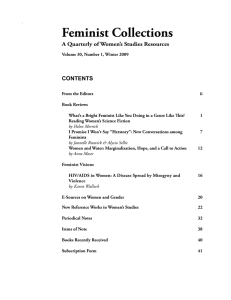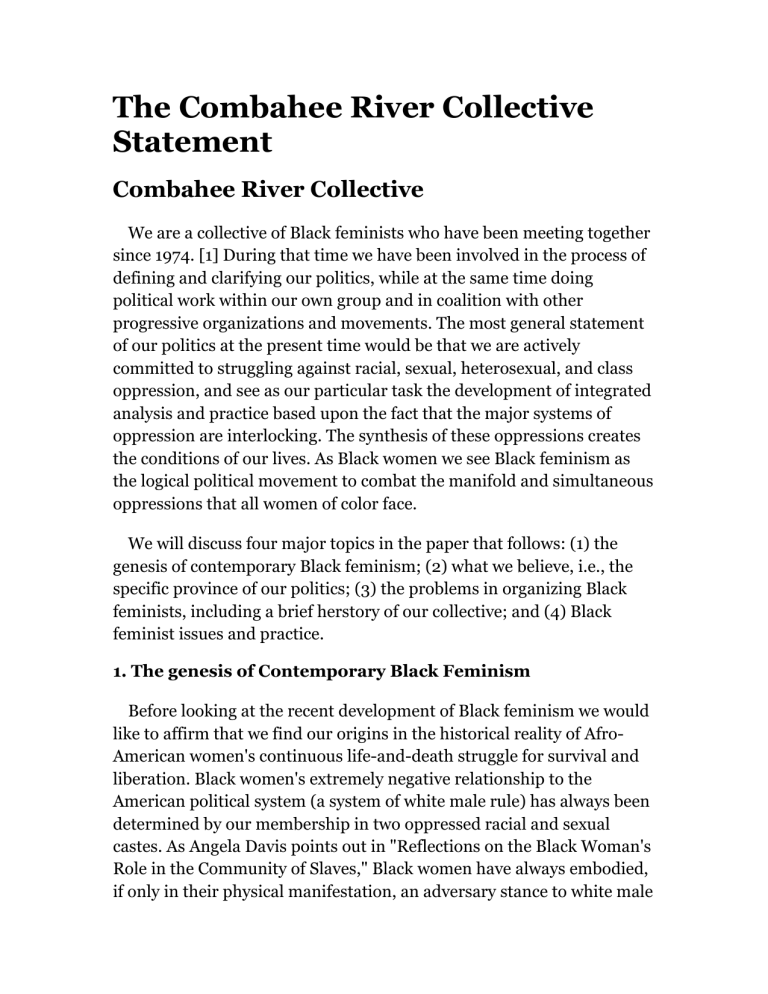
The Combahee River Collective Statement Combahee River Collective We are a collective of Black feminists who have been meeting together since 1974. [1] During that time we have been involved in the process of defining and clarifying our politics, while at the same time doing political work within our own group and in coalition with other progressive organizations and movements. The most general statement of our politics at the present time would be that we are actively committed to struggling against racial, sexual, heterosexual, and class oppression, and see as our particular task the development of integrated analysis and practice based upon the fact that the major systems of oppression are interlocking. The synthesis of these oppressions creates the conditions of our lives. As Black women we see Black feminism as the logical political movement to combat the manifold and simultaneous oppressions that all women of color face. We will discuss four major topics in the paper that follows: (1) the genesis of contemporary Black feminism; (2) what we believe, i.e., the specific province of our politics; (3) the problems in organizing Black feminists, including a brief herstory of our collective; and (4) Black feminist issues and practice. 1. The genesis of Contemporary Black Feminism Before looking at the recent development of Black feminism we would like to affirm that we find our origins in the historical reality of AfroAmerican women's continuous life-and-death struggle for survival and liberation. Black women's extremely negative relationship to the American political system (a system of white male rule) has always been determined by our membership in two oppressed racial and sexual castes. As Angela Davis points out in "Reflections on the Black Woman's Role in the Community of Slaves," Black women have always embodied, if only in their physical manifestation, an adversary stance to white male rule and have actively resisted its inroads upon them and their communities in both dramatic and subtle ways. There have always been Black women activists—some known, like Sojourner Truth, Harriet Tubman, Frances E. W. Harper, Ida B. Wells Barnett, and Mary Church Terrell, and thousands upon thousands unknown—who have had a shared awareness of how their sexual identity combined with their racial identity to make their whole life situation and the focus of their political struggles unique. Contemporary Black feminism is the outgrowth of countless generations of personal sacrifice, militancy, and work by our mothers and sisters. A Black feminist presence has evolved most obviously in connection with the second wave of the American women's movement beginning in the late 1960s. Black, other Third World, and working women have been involved in the feminist movement from its start, but both outside reactionary forces and racism and elitism within the movement itself have served to obscure our participation. In 1973, Black feminists, primarily located in New York, felt the necessity of forming a separate Black feminist group. This became the National Black Feminist Organization (NBFO). Black feminist politics also have an obvious connection to movements for Black liberation, particularly those of the 1960s and I970s. Many of us were active in those movements (Civil Rights, Black nationalism, the Black Panthers), and all of our lives Were greatly affected and changed by their ideologies, their goals, and the tactics used to achieve their goals. It was our experience and disillusionment within these liberation movements, as well as experience on the periphery of the white male left, that led to the need to develop a politics that was anti-racist, unlike those of white women, and anti-sexist, unlike those of Black and white men. There is also undeniably a personal genesis for Black Feminism, that is, the political realization that comes from the seemingly personal experiences of individual Black women's lives. Black feminists and many more Black women who do not define themselves as feminists have all experienced sexual oppression as a constant factor in our day-to-day existence. As children we realized that we were different from boys and that we were treated differently. For example, we were told in the same breath to be quiet both for the sake of being "ladylike" and to make us less objectionable in the eyes of white people. As we grew older we became aware of the threat of physical and sexual abuse by men. However, we had no way of conceptualizing what was so apparent to us, what we knew was really happening. Black feminists often talk about their feelings of craziness before becoming conscious of the concepts of sexual politics, patriarchal rule, and most importantly, feminism, the political analysis and practice that we women use to struggle against our oppression. The fact that racial politics and indeed racism are pervasive factors in our lives did not allow us, and still does not allow most Black women, to look more deeply into our own experiences and, from that sharing and growing consciousness, to build a politics that will change our lives and inevitably end our oppression. Our development must also be tied to the contemporary economic and political position of Black people. The post World War II generation of Black youth was the first to be able to minimally partake of certain educational and employment options, previously closed completely to Black people. Although our economic position is still at the very bottom of the American capitalistic economy, a handful of us have been able to gain certain tools as a result of tokenism in education and employment which potentially enable us to more effectively fight our oppression. A combined anti-racist and anti-sexist position drew us together initially, and as we developed politically we addressed ourselves to heterosexism and economic oppression under capItalism. 2. What We Believe Above all else, Our politics initially sprang from the shared belief that Black women are inherently valuable, that our liberation is a necessity not as an adjunct to somebody else's may because of our need as human persons for autonomy. This may seem so obvious as to sound simplistic, but it is apparent that no other ostensibly progressive movement has ever consIdered our specific oppression as a priority or worked seriously for the ending of that oppression. Merely naming the pejorative stereotypes attributed to Black women (e.g. mammy, matriarch, Sapphire, whore, bulldagger), let alone cataloguing the cruel, often murderous, treatment we receive, Indicates how little value has been placed upon our lives during four centuries of bondage in the Western hemisphere. We realize that the only people who care enough about us to work consistently for our liberation are us. Our politics evolve from a healthy love for ourselves, our sisters and our community which allows us to continue our struggle and work. This focusing upon our own oppression is embodied in the concept of identity politics. We believe that the most profound and potentially most radical politics come directly out of our own identity, as opposed to working to end somebody else's oppression. In the case of Black women this is a particularly repugnant, dangerous, threatening, and therefore revolutionary concept because it is obvious from looking at all the political movements that have preceded us that anyone is more worthy of liberation than ourselves. We reject pedestals, queenhood, and walking ten paces behind. To be recognized as human, levelly human, is enough. We believe that sexual politics under patriarchy is as pervasive in Black women's lives as are the politics of class and race. We also often find it difficult to separate race from class from sex oppression because in our lives they are most often experienced simultaneously. We know that there is such a thing as racial-sexual oppression which is neither solely racial nor solely sexual, e.g., the history of rape of Black women by white men as a weapon of political repression. Although we are feminists and Lesbians, we feel solidarity with progressive Black men and do not advocate the fractionalization that white women who are separatists demand. Our situation as Black people necessitates that we have solidarity around the fact of race, which white women of course do not need to have with white men, unless it is their negative solidarity as racial oppressors. We struggle together with Black men against racism, while we also struggle with Black men about sexism. We realize that the liberation of all oppressed peoples necessitates the destruction of the political-economic systems of capitalism and imperialism as well as patriarchy. We are socialists because we believe that work must be organized for the collective benefit of those who do the work and create the products, and not for the profit of the bosses. Material resources must be equally distributed among those who create these resources. We are not convinced, however, that a socialist revolution that is not also a feminist and anti-racist revolution will guarantee our liberation. We have arrived at the necessity for developing an understanding of class relationships that takes into account the specific class position of Black women who are generally marginal in the labor force, while at this particular time some of us are temporarily viewed as doubly desirable tokens at white-collar and professional levels. We need to articulate the real class situation of persons who are not merely raceless, sexless workers, but for whom racial and sexual oppression are significant determinants in their working/economic lives. Although we are in essential agreement with Marx's theory as it applied to the very specific economic relationships he analyzed, we know that his analysis must be extended further in order for us to understand our specific economic situation as Black women. A political contribution which we feel we have already made is the expansion of the feminist principle that the personal is political. In our consciousness-raising sessions, for example, we have in many ways gone beyond white women's revelations because we are dealing with the implications of race and class as well as sex. Even our Black women's style of talking/testifying in Black language about what we have experienced has a resonance that is both cultural and political. We have spent a great deal of energy delving into the cultural and experiential nature of our oppression out of necessity because none of these matters has ever been looked at before. No one before has ever examined the multilayered texture of Black women's lives. An example of this kind of revelation/conceptualization occurred at a meeting as we discussed the ways in which our early intellectual interests had been attacked by our peers, particularly Black males. We discovered that all of us, because we were "smart" had also been considered "ugly," i.e., "smart-ugly." "Smartugly" crystallized the way in which most of us had been forced to develop our intellects at great cost to our "social" lives. The sanctions In the Black and white communities against Black women thinkers is comparatively much higher than for white women, particularly ones from the educated middle and upper classes. As we have already stated, we reject the stance of Lesbian separatism because it is not a viable political analysis or strategy for us. It leaves out far too much and far too many people, particularly Black men, women, and children. We have a great deal of criticism and loathing for what men have been socialized to be in this society: what they support, how they act, and how they oppress. But we do not have the misguided notion that it is their maleness, per se—i.e., their biological maleness— that makes them what they are. As BIack women we find any type of biological determinism a particularly dangerous and reactionary basis upon which to build a politic. We must also question whether Lesbian separatism is an adequate and progressive political analysis and strategy, even for those who practice it, since it so completely denies any but the sexual sources of women's oppression, negating the facts of class and race. 3. Problems in Organizing Black Feminists During our years together as a Black feminist collective we have experienced success and defeat, joy and pain, victory and failure. We have found that it is very difficult to organize around Black feminist issues, difficult even to announce in certain contexts that we are Black feminists. We have tried to think about the reasons for our difficulties, particularly since the white women's movement continues to be strong and to grow in many directions. In this section we will discuss some of the general reasons for the organizing problems we face and also talk specifically about the stages in organizing our own collective. The major source of difficulty in our political work is that we are not just trying to fight oppression on one front or even two, but instead to address a whole range of oppressions. We do not have racial, sexual, heterosexual, or class privilege to rely upon, nor do we have even the minimal access to resources and power that groups who possess anyone of these types of privilege have. The psychological toll of being a Black woman and the difficulties this presents in reaching political consciousness and doing political work can never be underestimated. There is a very low value placed upon Black women's psyches in this society, which is both racist and sexist. As an early group member once said, "We are all damaged people merely by virtue of being Black women." We are dispossessed psychologically and on every other level, and yet we feel the necessity to struggle to change the condition of all Black women. In "A Black Feminist's Search for Sisterhood," Michele Wallace arrives at this conclusion: We exists as women who are Black who are feminists, each stranded for the moment, working independently because there is not yet an environment in this society remotely congenial to our struggle—because, being on the bottom, we would have to do what no one else has done: we would have to fight the world. [2] Wallace is pessimistic but realistic in her assessment of Black feminists' position, particularly in her allusion to the nearly classic isolation most of us face. We might use our position at the bottom, however, to make a clear leap into revolutionary action. If Black women were free, it would mean that everyone else would have to be free since our freedom would necessitate the destruction of all the systems of oppression. Feminism is, nevertheless, very threatening to the majority of Black people because it calls into question some of the most basic assumptions about our existence, i.e., that sex should be a determinant of power relationships. Here is the way male and female roles were defined in a Black nationalist pamphlet from the early 1970s: We understand that it is and has been traditional that the man is the head of the house. He is the leader of the house/nation because his knowledge of the world is broader, his awareness is greater, his understanding is fuller and his application of this information is wiser... After all, it is only reasonable that the man be the head of the house because he is able to defend and protect the development of his home... Women cannot do the same things as men—they are made by nature to function differently. Equality of men and women is something that cannot happen even in the abstract world. Men are not equal to other men, i.e. ability, experience or even understanding. The value of men and women can be seen as in the value of gold and silver—they are not equal but both have great value. We must realize that men and women are a complement to each other because there is no house/family without a man and his wife. Both are essential to the development of any life. [3] The material conditions of most Black women would hardly lead them to upset both economic and sexual arrangements that seem to represent some stability in their lives. Many Black women have a good understanding of both sexism and racism, but because of the everyday constrictions of their lives, cannot risk struggling against them both. The reaction of Black men to feminism has been notoriously negative. They are, of course, even more threatened than Black women by the possibility that Black feminists might organize around our own needs. They realize that they might not only lose valuable and hardworking allies in their struggles but that they might also be forced to change their habitually sexist ways of interacting with and oppressing Black women. Accusations that Black feminism divides the Black struggle are powerful deterrents to the growth of an autonomous Black women's movement. Still, hundreds of women have been active at different times during the three-year existence of our group. And every Black woman who came, came out of a strongly-felt need for some level of possibility that did not previously exist in her life. When we first started meeting early in 1974 after the NBFO first eastern regional conference, we did not have a strategy for organizing, or even a focus. We just wanted to see what we had. After a period of months of not meeting, we began to meet again late in the year and started doing an intense variety of consciousness-raising. The overwhelming feeling that we had is that after years and years we had finally found each other. Although we were not doing political work as a group, individuals continued their involvement in Lesbian politics, sterilization abuse and abortion rights work, Third World Women's International Women's Day activities, and support activity for the trials of Dr. Kenneth Edelin, Joan Little, and Inéz García. During our first summer when membership had dropped off considerably, those of us remaining devoted serious discussion to the possibility of opening a refuge for battered women in a Black community. (There was no refuge in Boston at that time.) We also decided around that time to become an independent collective since we had serious disagreements with NBFO's bourgeois-feminist stance and their lack of a clear politIcal focus. We also were contacted at that time by socialist feminists, with whom we had worked on abortion rights activities, who wanted to encourage us to attend the National Socialist Feminist Conference in Yellow Springs. One of our members did attend and despite the narrowness of the ideology that was promoted at that particular conference, we became more aware of the need for us to understand our own economic situation and to make our own economic analysis. In the fall, when some members returned, we experienced several months of comparative inactivity and internal disagreements which were first conceptualized as a Lesbian-straight split but which were also the result of class and political differences. During the summer those of us who were still meeting had determined the need to do political work and to move beyond consciousness-raising and serving exclusively as an emotional support group. At the beginning of 1976, when some of the women who had not wanted to do political work and who also had voiced disagreements stopped attending of their own accord, we again looked for a focus. We decided at that time, with the addition of new members, to become a study group. We had always shared our reading with each other, and some of us had written papers on Black feminism for group discussion a few months before this decision was made. We began functioning as a study group and also began discussing the possibility of starting a Black feminist publication. We had a retreat in the late spring which provided a time for both political discussion and working out interpersonal issues. Currently we are planning to gather together a collectIon of Black feminist writing. We feel that it is absolutely essential to demonstrate the reality of our politics to other Black women and believe that we can do this through writing and distributing our work. The fact that individual Black feminists are living in isolation all over the country, that our own numbers are small, and that we have some skills in writing, printing, and publishing makes us want to carry out these kinds of projects as a means of organizing Black feminists as we continue to do political work in coalition with other groups. 4. Black Feminist Issues and Projects During our time together we have identified and worked on many issues of particular relevance to Black women. The inclusiveness of our politics makes us concerned with any situation that impinges upon the lives of women, Third World and working people. We are of course particularly committed to working on those struggles in which race, sex, and class are simultaneous factors in oppression. We might, for example, become involved in workplace organizing at a factory that employs Third World women or picket a hospital that is cutting back on already inadequate heath care to a Third World community, or set up a rape crisis center in a Black neighborhood. Organizing around welfare and daycare concerns might also be a focus. The work to be done and the countless issues that this work represents merely reflect the pervasiveness of our oppression. Issues and projects that collective members have actually worked on are sterilization abuse, abortion rights, battered women, rape and health care. We have also done many workshops and educationals on Black feminism on college campuses, at women's conferences, and most recently for high school women. One issue that is of major concern to us and that we have begun to publicly address is racism in the white women's movement. As Black feminists we are made constantly and painfully aware of how little effort white women have made to understand and combat their racism, which requires among other things that they have a more than superficial comprehension of race, color, and Black history and culture. Eliminating racism in the white women's movement is by definition work for white women to do, but we will continue to speak to and demand accountability on this issue. In the practice of our politics we do not believe that the end always justifies the means. Many reactionary and destructive acts have been done in the name of achieving "correct" political goals. As feminists we do not want to mess over people in the name of politics. We believe in collective process and a nonhierarchical distribution of power within our own group and in our vision of a revolutionary society. We are committed to a continual examination of our politics as they develop through criticism and self-criticism as an essential aspect of our practice. In her introduction to Sisterhood is Powerful Robin Morgan writes: I haven't the faintest notion what possible revolutionary role white heterosexual men could fulfill, since they are the very embodiment of reactionary-vested-interestpower. As Black feminists and Lesbians we know that we have a very definite revolutionary task to perform and we are ready for the lifetime of work and struggle before us. [1] This statement is dated April 1977. [2] Wallace, Michele. "A Black Feminist's Search for Sisterhood," The Village Voice, 28 July 1975, pp. 6-7. [3] Mumininas of Committee for Unified Newark, Mwanamke Mwananchi (The Nationalist Woman), Newark, N.J., ©1971, pp. 4-5. THE COMBAHEE RIVER COLLECTIVE: "The Combahee River Collective Statement," copyright © 1978 by Zillah Eisenstein.

